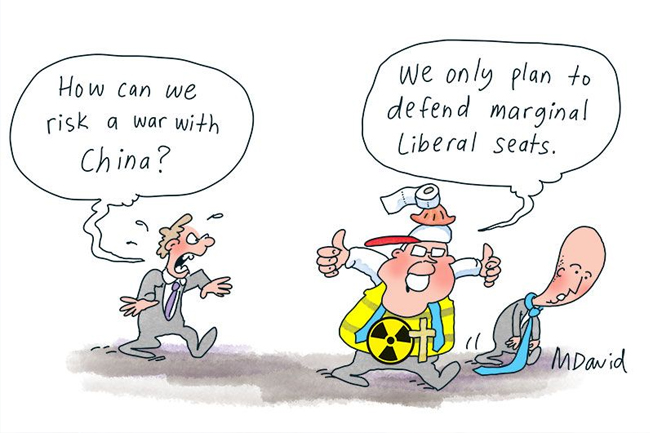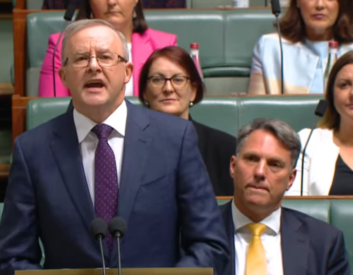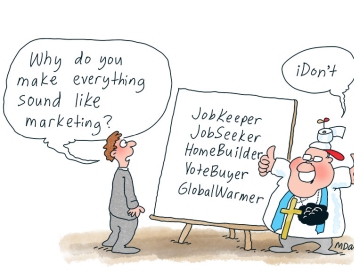The lack of media diversity is robbing Australians of quality journalism. Dr Geoff Davies offers some creative ideas to stop Rupert Murdoch and Gina Rinehart inflicting their psychopathic and toxic world views on us.
MOST DISCUSSIONS of the roles of media in Australia are painfully narrow and superficial. Commercial media apologists claim "independence" (from whom?), demand "freedom" (well, but not for the bad guys) and have the gall to talk about ‘quality.
A proposal to enforce the most minimal standards on commercial media provoked hysterical indignation at the supposed threat to free speech. The idea of actually requiring editorial comment to be separated from reporting didn’t get a look in, let alone penalising those who report only a highly biased selection of the news, or are systematically and deliberately divisive (which is all of them), or who persistently promote falsehoods.
The process of news selection is mostly hidden away, but it leaves huge gaps in Australian coverage. Media diversity is supposed to ensure comprehensive coverage, but the same few big players dominate all media, including the internet.
Who’s willing to talk seriously about breaking up oligopolies? Few seem to conceive that ownership by government or by billionaires are not the only possibilities.
Meanwhile, the ABC’s traditional and very valuable role has been steadily subverted, and it has few prominent defenders.
These issues can be highlighted by three examples: Charlie Hedbo, the screening of First Contact late last year by SBS and NITV, and recent cuts to ABC and SBS funding.
Nobody deserves to be murdered for what they write or draw. Nevertheless, it is clear the magazine Charlie Hedbo is deliberately and extremely offensive to certain ethnic and religious groups. It is hateful. Have a look for yourself, especially the images in Loonwatch.com in a piece entitled Why I'm Not Charlie Hebdo. Sexualising Mohamed? What is the point of that, except to cause the greatest possible offence. And what is the satirical point in the depiction of the innocent girls kidnapped and sold as sex slaves by Boko Haram as "welfare queens"? It can only incite conflict.
At the very least, offerings like Charlie Hedbo are foolish and unhelpful. They are also irresponsible, highly irresponsible in my view because they promote division and hatred. Should they be banned? I think probably so. Australia’s far right, inevitably, is using the Hedbo murders to claim again that we should weaken the Racial Discrimination Act, which would probably prevent Hedbo from publishing its incitements in Australia.
Yes, Australia’s far right is all for freedom of speech — for the bullying Andrew Bolt. But not for a Muslim to talk about a century of Western meddling in the Middle East. Not for an ABC that raises legitimate questions about how some boat people were treated. And if anyone should seriously question any part of the far-right’s ideological program, the attack dogs are called out, not to debate them but to trash their reputations. Freedom, in other words, for our guys, for Team Australia, but not for the ones we don’t like.
Jon Stewart slams Rupert Murdoch for racist tweets
What we need, actually, more than rules and laws about speech, is to turn the heat down, to stop shouting, to look for the human being in the other person, to listen so as to understand, and to reach out to find common cause. That’s just what you won’t find in the routine mainstream media output, but you can find it in Father Rod Bower of the Anglican Parish of Gosford and in quite a few other Australians who’s decency has not been extinguished.
More wisdom from Fr. Rod Bower Anglican Parish of Gosford pic.twitter.com/Smz65XS87N
— Paul A (@PyeAlpha) January 10, 2015
Now to First Contact, what does it reveal about our media? To remind you, First Contact took six Australians who had no previous direct contact with Aborigines and immersed them for a month in Aboriginal Australia. If the commercial media’s offerings had some serious quality, then shows like First Contact would not be so remarkable, and so much remarked. Many more of us would already know the gist of what the five participants who stayed the course learnt, in the course of that month’s immersion.
The participants began with a range of attitudes, from sympathetic to hostile. All of the five gained much greater knowledge, and all of them ended with more empathy for the difficulties faced by Aborigines everywhere in Australia.
The hostile attitudes some of them began with seem to be common enough among Australians. Not uncommonly, Aborigines are regarded as dirty, lazy freeloaders who get huge amounts of financial assistance that they dissipate in booze and partying, while refusing to make the effort to find a job. If they’re often in jail it’s because they won’t make the effort to break bad habits.
The show’s participants got some glimpses of how past traumas resonate down the generations leading, for example, to alcohol abuse and its attendant violence. They learnt of cultural and social pressures that make it extra hard to break out of the destructive patterns, and of the lack of consistent support from outside if anybody did try.
Some of the participants found they had experiences in common with some of their new indigenous acquaintances. They realised similar things can happen to blacks or to whites, that skin colour doesn’t matter that much. They recognised they had only been able to rise above some early difficulties because of support they got from family, friends or community. They met leaders who have been helping their communities, against great odds, and replacing despair with hope.
None of this is so hard to find out, but you have to go looking for it. The question here is why so many of us are so ignorant of such a significant group of our fellow Australians. A fair part of the answer is, unfortunately, pretty obvious.
The media, especially the commercial media, specialise in sensationalism, superficiality, conflict and short attention spans. Reports that go into greater depth are uncommon, especially on TV.
The result is that ignorance is rarely challenged, negative stereotypes are exaggerated, gut reactions are triggered, and hostile and destructive attitudes are thereby encouraged. When shock jocks and partisan attack dogs chime in, propagating misinformation and fanning fear, the damage is compounded.
Why do the commercial media take such a superficial and unhelpful approach, particularly to a subject so replete with sensitivities? The answer, fundamentally, is because it sells papers and attracts viewers and mouse clicks. In crude simplicity, they do it for profit.
Enter the ABC, which isn’t constrained by the competitive imperative. It’s job is to inform and entertain, and especially to fill in the large gaps left by the commercial media.
At least that used to be its job. For the last three decades or so, both major parties have heavily criticised the ABC and both have cut its funding, the Coalition more so but Labor has done its share. One reason has been the neoliberal ideology that dominates our political mainstream and is hostile to any government role. Another has been governments’ thin-skinned sensitivity to criticism, though informed criticism is part of the ABC’s (and all media’s) job of holding governments to account.
No cuts to ABC, SBS, says Tony Abbott hours before the 2013 Federal election
A more recent reason is that commercial media’s revenues are plunging, as the internet takes over, and those most hostile to the ABC (notably including the commercial media moguls) want the ABC cut back so it won’t have an “unfair” advantage.
The result of these attacks, of stacking the ABC board with right-wingers, and of putting a former Liberal staffer in charge of daily business, is that the ABC is more timid, more superficial, and takes its measure of “balance” to be mid-way between right-wing Labor and far-right Liberal.
The commercial media’s complaints might have some shred of validity if they indeed regularly delivered “quality journalism”. However it is hard to find “news” reports these days that do not also include judgmental terms and interpolations, thus failing the elementary requirement to separate editorial comment from news reporting. Much so-called reporting goes further, and flagrantly injects a point of view. The biased selection of news also leaves much of our world unreportedIf our commercial media really did deliver “quality”, then most of us would have some understanding of the special difficulties faced by Aborigines. Most of us would know asylum seekers are legal, small in number, mostly genuine refugees, and mostly potentially excellent citizens. Most of us would know that only a tiny minority of climate scientists think we are not causing global warming, and that it is not a dire threat. More of us might know that the US and UK overthrew a democratic government of Iran in 1953 and re-installed the Shah, who would allow them to extract cheap oil without significantly compensating Iran. So began the modern era of strife in the Middle East, though the West’s meddling goes back a century.
As for independence, apologists for commercial media bang on endlessly about sinister government intentions and the threat of totalitarianism, but they never mention that media ownership in Australia is among the most concentrated the world. Would that we could have more independence from Rupert Murdoch. Nor do neoliberal campaigners note that political attacks on the ABC, including cuts to its funding, have the clear goal of reducing its independence from government.
(Image courtesy John Graham)
Many Australians may not realise how unusual and valuable the ABC is. Try living in the U.S. for a while and you realise the ABC’s grounding of relatively balanced news and informed comment, plus quality and diverse minority entertainments, gives our culture a firm floor that greatly enhances the quality of our society and keeps us from sinking into the worst forms of triviality, ignorance and delusion. Or at least it used to.
Almost never mentioned in the regular brouhahas is that anyone who wants the right to broadcast (by any means) to large numbers of our citizens also ought to have responsibilities. Those responsibilities ought to include not being consistently misleading or factually incorrect, clearly distinguishing opinion from reporting, and not systematically promoting discord.
Beyond that, we need a deeper perspective on the role of media. Any society, small or large, needs to maintain a continuing conversation about itself, in order to deal with its affairs. In large societies we use technologies to extend the reach of our voices and ears. Yet fundamentally we still need to do what clans and villages did and do, which is to talk things through. The technology required in large societies has allowed a few people to appoint themselves gate-keepers of our communal conversation. It is nuts to yield such power to them. The media play a critical role in our society, and they need appropriate special rules, just as much as the courts do.
We need to be more creative about how our media are owned and run. One option would be for each media outlet to be owned collectively by its audience members, through shares, with no-one able to own more than a small fraction of shares, perhaps one per cent. Another would be for a trust fund to be set up. Such arrangements might not be easy to set up, but any such thing would be a vast improvement on letting Rupert Murdoch and Gina Rinehart inflict their psychopathic and toxic world views on us.
(Image courtesy Keogh Cartoons)
Dr Geoff Davies is an author, commentator and scientist. He is a retired geophysicist at the Australian National University and the author of Sack the Economists (Nov 2013, sacktheeconomists.com). He blogs at BetterNature: betternature.wordpress.com.
Buy John Graham originals from IA's online store.

Monthly Donation
Single Donation









